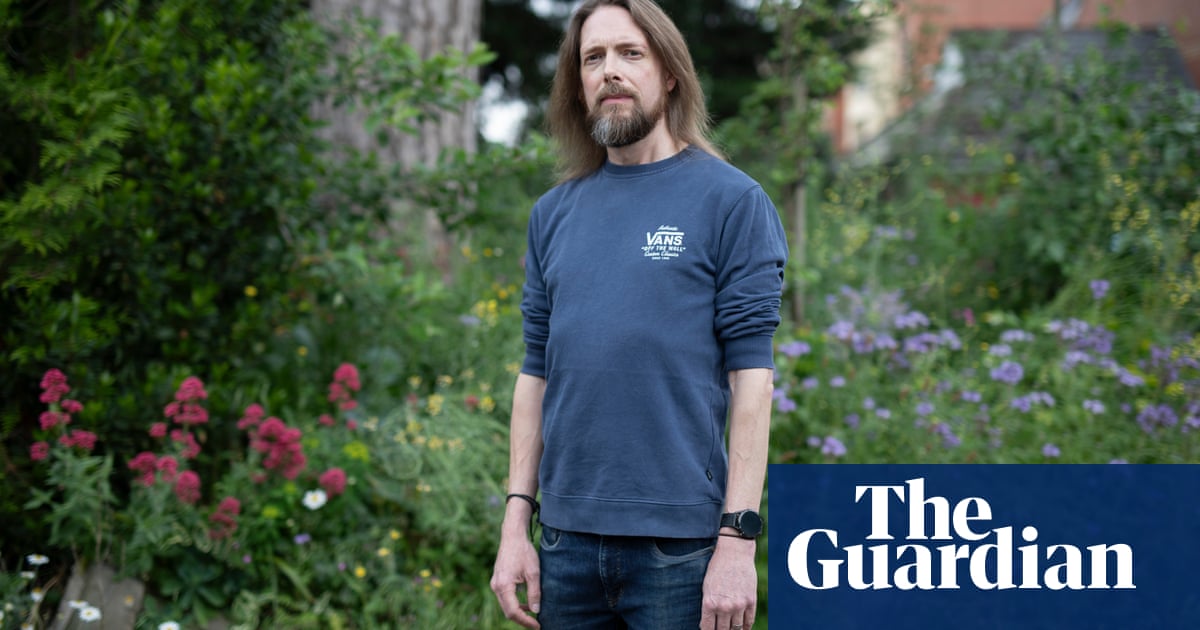
Andy Evans was 13 when his mum took him for an unexpected drive in the countryside. “I thought: this is weird. Why are we here? We don’t do this,” he remembered. “We sat for a couple of minutes and then she turned to me with tears in her eyes. And she said: ‘Do you know what HIV is?’ And I said: ‘Well, I’ve heard of it … Isn’t it that disease that kills you?’ And she said: ‘Yep, that’s right. It’s been in the factor VIII and you’ve got it.’”
Factor VIII was the concentrated blood clotting protein he had been receiving for his haemophilia since being diagnosed as a baby. Touted as a wonder drug to stop internal bleeding, it was so easy to mix with water and inject with a syringe that Evans was able to administer it himself at home before his fourth birthday.
“I learned to inject myself at the age of three years and 10 months,” he said. “Apparently, it’s some sort of record. They sent people out from the blood transfusion service to take photographs of me to put up in their offices.”
When Evans became the NHS poster boy for factor VIII, back in the early 1980s, he had no idea that the treatment he was injecting himself with was contaminated with HIV and hepatitis.
Forty years later, after surviving against the odds to reach the age of 47, he has become one of the most prominent campaigners demanding the truth about how 30,000 people in the UK like himself were treated with infected blood.
When Evans’s mum told him he had HIV, back in 1989, he put on a brave face. “I decided to be the big guy. And I said: ‘Don’t worry, I’ll just become a scientist or a doctor when I’m older and cure myself.’”
His illnesses caused him to miss so much school that he never did forge a career in medicine and now works as a web designer. There is still no cure for haemophilia. But via Tainted Blood, the campaign group he co-founded in 2006, he has ensured that politicians, drug companies and doctors have been forced to admit that the UK’s contaminated blood scandal was not simply a case of “incredibly bad luck”, as the former prime minister John Major put it.
The group pushed relentlessly for the independent inquiry that will publish its final report on Monday. Sir Brian Langstaff, the high court judge who chaired the inquiry, has already ordered the government to compensate those affected and declared that “wrongs were done at individual, collective and systemic levels”.
Despite being “burned so many times before”, Evans hopes that Langstaff will put on the record that “all we’ve been saying for all these years is the truth”. Namely that successive governments ignored multiple warnings about contaminated blood and allowed him and thousands of others to become infected by contaminated plasma bought on the cheap from drug addicts and prisoners in the US.
Factor VIII was made by pooling the plasma of tens of thousands of donors, and it only took one infected sample to contaminate the entire batch.
Because of a shortage of blood products in the UK, the NHS bought it in from the US. From the early 1960s to the early 1980s, American pharmaceutical companies paid prisoners between $5 and $7 each time, and the plasma was sold for about $100 into the drug industry supply chain.
after newsletter promotion
Drug firms got rich and several generations of haemophiliacs were infected with HIV and hepatitis C. Evans’s youth was in tatters. He was encouraged to keep his HIV status a secret, but told a teenage girlfriend when it looked as though their relationship might turn sexual, only for the girl to say she could not cope with the news.
“It was absolutely understandable,” he said. “I mean, she was 16 years old, and that’s not something you want to get involved with when you’re 16.
“But for me, it wrecked my confidence. It was a massive blow to the body and mind. And that was it for me for relationships for many, many years.”
When Evans was 16, he developed Aids and spent four years in hospital. He emerged friendless. “They’d all moved on with their lives, they’d been to university, they’d got relationships,” he recalled. “If I had a goal, it would have been to reach the year 2000. Because that to me was the future. And once I’d done that, I was good to go. I could die in peace.”
But he survived to see the new millennium, and, thanks to modern HIV treatment which suppresses the virus, managed to have three children with his wife, Michelle. Gareth Lewis, his co-founder at Tainted Blood, was not so lucky and died in 2010 – one of at least 2,900 people to have died before their time in the UK after receiving contaminated blood products.
Source: theguardian.com


















